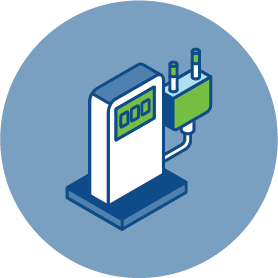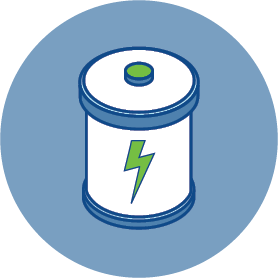Out of the shortest month came big news. The European Commission released its proposal for revised CO2 heavy-duty vehicle (HDV) standards for trucks, which would require most new trucks in the European Union (EU) to lower their emissions by 45% in 2030, 65% in 2035, and 90% in 2040 (compared to 2019/2020 levels). Right now the standards adopted in 2019 only require new trucks to reduce CO2 emissions by 15% by 2025 and 30% by 2030. The importance of increasing these requirements cannot be overstated, as trucks and buses are the highest emitters on Europe’s roads, producing over a quarter of road transport-related CO2 emissions while making up only 2% of the vehicle stock.
While it is great to see the Commission aiming much higher with this proposal, it is dismaying that the Commission did not propose a 100% target for 2040, in line with the Global Memorandum of Understanding (Global MOU). With 27 signatory countries worldwide and counting, the Global MOU shows how broad support is for committing to 100% new zero-emission medium- and heavy-duty vehicle (ZE-MHDV) sales by 2040. The Commission’s proposal will be discussed by the EU Parliament and the member states in coming months, and we hope during this time the Global MOU will continue to build momentum and influence the conversation about decarbonizing our planet.
— Owen MacDonnell, Technical Project Manager II, CALSTART / Drive to Zero
Program Updates
Zeroing in on ZEBs
CALSTART’s annual inventory of zero-emission buses (ZEBs) funded, ordered, delivered, or deployed in North America (the United States and Canada) has been released for 2022. Full-size transit ZEBs have grown to 5,480 buses nationally, an increase of 66% since the 2021 count. While California remained the state with the most ZEBs adopted, numerous other states doubled their count. Fuel cell electric buses saw a 64% increase in adoption since 2021, and adoptions of small ZEBs grew by 42% across the country. In Canada, the total number of ZEBs grew to 859, including 219 new full-size buses counted this year. Particularly in light of the fact that the U.S. recently added its name as a signatory to the Global MOU, this report shows how the U.S. is making progress toward the Global MOU’s goals.
Join the Drive to Zero Team
Join the Drive to Zero Team
Drive to Zero has an exciting job opening: the Global Program Manager will lead Drive to Zero’s partner recruitment and engagement, infrastructure work, and Drive to Zero activities in key regions. Please help us spread the word.
News Updates
As we head into winter’s home stretch, extremes in weather around the world remind us of the urgency of the climate crisis. Fortunately, there is good news to share, including how government policies—including the European Commission’s proposal to mandate a 90% reduction in new trucks’ emissions by 2040—continue to advance the electrification effort. To help reach its goal of becoming carbon neutral, Copenhagen will be replacing all its diesel-powered buses with electric buses by 2025. In the United States, the California Air Resources Board (CARB) granted Nikola approval for its hydrogen fuel cell Tre truck to be eligible for the agency’s Hybrid and Zero-Emission Truck and Bus Voucher Incentive Project (HVIP).
The past few weeks also saw positive developments with zero-emission bus purchases and deployments. Ohio-based Endera Motors was just awarded the largest statewide purchasing contract in U.S. history, an order for an estimated 1,000 electric buses by the California Association for Coordinated Transportation (CALACT). Mitsubishi HC Capital Canada will now be backing Lion Electric’s financing division in offering up to 100% of the cost of fleets in the United States and Canada that are converting to electric school buses and trucks. In Europe, EMT Madrid revealed that its first bus rapid transit (BRT) service will begin this May, using a fleet of 150 electric buses and a budget of €12.8 million for the necessary infrastructure. Sweden’s Transdev AB placed an order for 52 electric busesfrom BYD, its largest order from the Chinese manufacturer since 2015.
Notable stories also broke this month in the world of both fuel cell trucks and charging infrastructure. British consortium Hub2Hub received £6.6 million in funding to create a heavy-duty hydrogen fuel cell truck capable of level 4 autonomous driving. Instead of starting from scratch, fuel cell system developer zepp.solutions of the Netherlands announced that it will be retrofitting an existing diesel truck from an undisclosed “well-known truck manufacturer” to be powered by hydrogen fuel cells. This builds on zepp.solutions’ recent success converting two Liebherr excavators from diesel to hydrogen fuel cell systems. Air Liquide and Total Energies have partnered to support this growing sector by deploying a network of more than 100 hydrogen stations on major strategic corridors in Europe. The city of Aalborg in Denmark is helping power battery-electric buses by opening the largest electric bus charging depot in the entire Nordic region, installing 124 Kempower Satellite fast chargers and the Kempower ChargEye cloud-based charging management system. Finland’s Kempower is also providing the technology for 15 fast-charging points at a new charging hub operated by E-Mobility for electric trucks in the Swedish city of Gothenburg. Promoting a different approach to both charging and driving, U.S.-based WiTricity announced a partnership with Chinese manufacturer Yutong Bus to offer wireless inductive charging for autonomous electric minibuses.
Finally, great progress was made with zero-emission vehicles fulfilling deliveries and serving utilities. Mercedes-Benz announced that it will be producing an electric version of its ubiquitous Sprinter van in both North America and Europe starting this year. Electrive demonstrated that Ford’s electric E-Transit delivers more power than the popular van’s diesel version and is comparable to diesel delivery vans in terms of range. German freight company DACHSER announced it will create 10 additional zero-emission delivery zones, adding to the 12 it already operates in Europe. British water supply and treatment utility Yorkshire Water unveiled its plan install to up to 1,000 charging points for electric vehiclesin its locations and its employees’ homes, furthering its goal of reaching net zero by 2030. Residents in Paris’ 13th Arrondissement are in luck, as their trash will now be collected by the 18 new Renault electric refuse trucks placed into operation by the city to help meet the Paris Climate Plan’s goals.
Please share new information, potential partners, and innovative practices to achieve our Drive to Zero goals at info@globaldrivetozero.org. Follow us on Twitter @TeamDrivetoZero. Please feel free to share this newsletter with others.
– Justin Slosky, Technical Writer, CALSTART
News Digest
 |
Fleet Deployments
|
 |
Manufacturers and Models: Trucks and Buses |
 |
Government Policies
|
 |
Financial Incentives |
 |
Fuels & Infrastructure
|
 |
Batteries & Technology |
